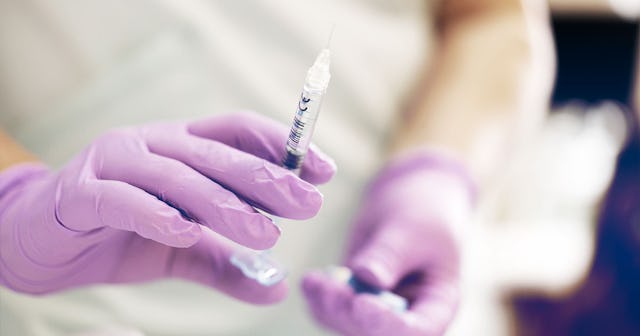What To Know About Dermal Fillers And The Moderna Vaccine

Shortly after the Moderna vaccine was approved by the FDA, a friend sent me a warning: don’t get the Moderna vaccine. When I asked why, she said folks who’d been injected with dermal fillers developed reactions to the vaccine. More specifically, two patients who had cheek filler injections six months prior to receiving the Moderna vaccine and one patient who received lip fillers two days after receiving the Moderna vaccine had reactions.
I told my friend not to worry. One, I’d never gotten fillers. (It’s on my life to-do list, so she was right to send the warning my way, but I haven’t circled back around to that thought.) And two, even if I had gotten fillers, I wouldn’t be freaking out. Because, while there’s reason to be cautious, the science doesn’t support a freak out.
The Reactions Were Rare And Mild
As of this writing, more than four million people have received their first dose of COVID-19 vaccine, either the Pfizer or the Moderna version. Of those millions, only three individuals who received the Moderna vaccine and who also had received hyaluronic acid (HA)-based filler had a reaction. The reactions consisted of facial or lip swelling. In all three cases, the swelling and inflammation were in the area that had been given the filler, says Shirley Chi, MD, a California-based dermatologist.
In the case of the patient who received lip fillers after receiving the Moderna vaccine, there’s some question over whether the inflammation was truly due to vaccine response or the result of normal swelling that happens after the injection of fillers.
Taken together, it’s clear that the risk is there, but extremely rare. While every patient’s reactions should be noted, and each reaction is a reason for experts and the public alike to pay attention, it’s important to put the number of reactions into perspective–and to remember that most people experience only mild side effects.
The Reactions Were All Easily Treatable
In all three cases, the reactions were mild and temporary. They resolved either on their own or with simple treatment, including steroids and/or antihistamines.
In an update to its members, Herluf G. Lund, MD, President of The Aesthetic Society, wrote that none of the reactions were considered life-threatening, none required hospitalization or an EpiPen, and there were no-long term complications reported in filler patients who’d received the vaccine.
The Reactions Are Not COVID-19 Vaccine Specific
Ihor Bulyhin/Getty
Though we’re all rightly hyper-focused on COVID-19 vaccines, it’s important to note that these reactions are not specific to the COVID-19 vaccine. “As with all vaccines, swelling of the face and lips is not an uncommon side effect,” Lund wrote. It’s clear that the COVID-19 antibodies the body forms in response to the COVID-19 vaccine “do not fight or attack dermal fillers.”
The “vaccine triggers a Type IV hypersensitivity reaction to the HA filler. Type IV hypersensitivity reactions are delayed allergic reactions to any foreign substance in the body. Many triggers can induce the late-onset response — including the flu vaccine, common cold, and certain medications — and it can happen several months to even a year after getting the injectable,” according to AEdit.com.
Current evidence suggests a link between Juvéderm Vycross collection of filler — including Voluma, Vollure, and Volbella — and Type IV hypersensitivity reactions, but brands like Restylane and Revance RHA have also been associated with reports of swelling.
The Benefits of Vaccination Outweigh The Risks
All the reactions reported by patients who had dermal fillers have been mild, localized, rare, and easily treatable. When compared to a virus that could lead to death, long-term complications, or any other number of untold devastating outcomes, the benefits of vaccination certainly outweigh the risks.
In his update to the Aesthetic Society, Lund confirmed this sentiment and wrote: “Having a history of dermal fillers should not bar someone from being vaccinated. The risks from acquiring and being infected with the COVID-19 virus far outweigh the risks from a reaction to one of the vaccines if the patient has a history of using dermal fillers.”
There’s a fair amount of suspicion surrounding the vaccines, though hopefully some of that distrust is dissipating thanks to widespread public health campaigns. Some of that suspicion is no doubt due to the fact that the Moderna vaccine—along with the Pfizer vaccine and all the others coming down the pipeline—is new, and seemingly developed fast. (And we’ve all grown up prepared to be suspicious of anything that feels too good to be true.) But experts have assured us time and time again that the vaccines are safe for the majority of people, and what feels fast to the public is actually the result of years of work and a global scientific focus on a single problem.
Which all goes to say that: While, yes, a reaction to a vaccine, especially the COVID-19 vaccine, is a reason to pay attention, it is not a reason to freak out. Especially not when we’re so close to reaching the light at the end of this dark pandemic tunnel–thanks to vaccines.
Information about COVID-19 is rapidly changing, and Scary Mommy is committed to providing the most recent data in our coverage. With news being updated so frequently, some of the information in this story may have changed after publication. For this reason, we are encouraging readers to use online resources from local public health departments, the Centers for Disease Control, and the World Health Organization to remain as informed as possible.
This article was originally published on